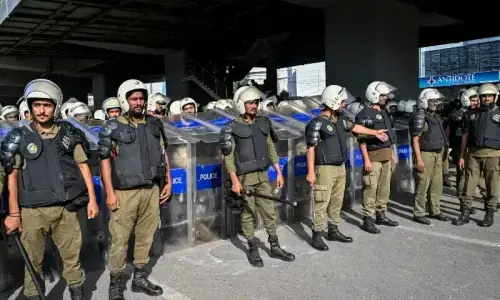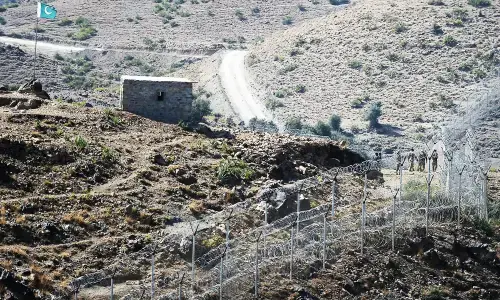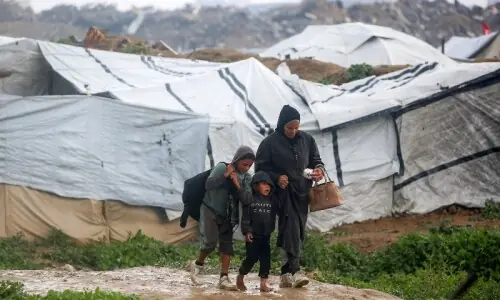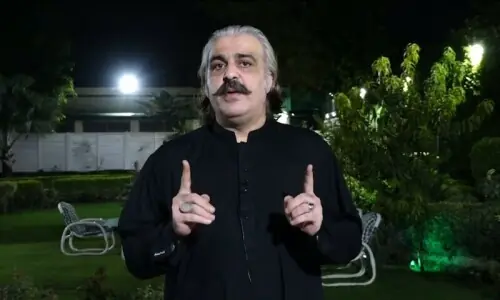ISLAMABAD, Aug 4: It’s the 1980s in Pakistan. A young, pensive man, lost deep in his thoughts, ambles down an alley. As he nears the road, a small blue van squeals to a stop in front of him: a man hops out and knocks him unconscious, grabs his arms, flings him into the van, and drives away.
Haal, a short film made by Assad Zulfiqar Khan, is set during General Ziaul Haq’s regime, and offers a peek into one of the most eerie and frightening chapters of Pakistan’s past.
The film illustrates the stories of two citizens, who in their own distinct way, defied Zia’s decrees as an act of resistance and rebellion. The film is essentially a commentary on how Zia transformed Pakistan’s society in terms of its liberal features like dance, music, and writing; although the country is no longer under his rule, his ideas live on in present-day Pakistan.
In the film, Zia’s regime abducts, tortures, and interrogates a young man to track down another citizen responsible for authoring a powerful pamphlet condemning Ziaul Haq’s actions as a leader, and his ordinances administered unto the people in the name of Islam.
“The Pakistan Army is taking advantage of Islam and is leading us down a path of hypocrisy and destruction,” the pamphlet read.
In one of the film shots, a macabre image of Zia is seen saying: “It is my wish that the civil administration run without fear. I want the police to serve society. Newspapers should protect freedom of thought. However, they should not stray from our moral code…And if anyone tries to disturb the peace, he will be dealt with harshly.”
Haal depicts not only the consequences that are faced by those who resist his rule, but how the rule itself is absolutely justified because of the ruler’s personal definition of Islam.
In the film, a clip of Zia speaking on schooling in Pakistan is shown in the news: “I want all other institutions to also adopt the syllabus recommended by the Council of Islamic Ideology,” he orders. “This will help spread a uniform message of Islam.”
Not far from where the man — who was kidnapped earlier — is being interrogated, a woman is lightly plodding the ground with her feet adorned with ghungroo, or ankle bells, swirls serenely like a dervish, not missing a single beat: Tha Thin Thin Thum, Tha Thin Thin Thum, is her tempo.
This classical Indian dance, known as Kathak dance — an expressive form of storytelling in northern India — was banned and considered a low and immodest act during Zia’s rule.
The woman is a classical Indian dance teacher in Pakistan who instructs her female students on the balcony of her home. As they all move in sync with each other’s steps to the Kathak beat, the father of one of the students barges into her home and onto the balcony, uninvited.
Infuriated, he bellows that the dance teacher is a “Hindu whore” corrupting his daughter, and that she should return to where she came from.
Coming out from the screening, Erum Haider, a young Pakistani woman who lived through the years that Zia was in power, shared her views: “The Zia regime had an impact on my generation in ways that I'm not aware of. This film is a way for me to discover how things were, and how they shaped what I experience now in Pakistan. It wasn't just Zia, however, even Bhutto made concessions to a very narrow politicised view of Islam.”
She also commented, “I love how the movie shows two artists fighting intolerance in the 80s. This is a great short film that is made by a young filmmaker who is also fighting against censorship, and I hope to see more films like this from our filmmakers.”
Assad Zulfiqar, the director of the film, explained, “This film is, in a way, supposed to mirror our society today, and I wanted the audience to feel a sense of familiarity with the film.”
Assad decided not to choose a specific year the film takes place in, as it is meant to represent that era and, indirectly, every era after.
When night falls, the classical Indian dancer suddenly hears the breaking of glass, followed by men chanting outside of her home against her shameless dancing, corrupting their women.
The men are carry burning torches with them, as they approach. She has no choice, and in the night, she makes her escape.






























